Altcoins are alternative cryptocurrencies to Bitcoin, created to offer improvements or serve different functions like faster transactions, enhanced privacy, or smart contract support. Popular examples include Ethereum, Ripple, and Litecoin, each with unique features and uses. They drive innovation in blockchain technology and expand the crypto ecosystem. If you want to understand how altcoins work, their key features, and how to get started safely, there’s much more to explore below.
Key Takeaways
- Altcoins are cryptocurrencies other than Bitcoin, created to improve features or serve different purposes.
- They often build on Bitcoin’s code but introduce innovations like faster transactions or enhanced privacy.
- Altcoins support various functions such as smart contracts, decentralized apps, and niche industry uses.
- They carry risks like high volatility, security flaws, and lack of regulation, requiring careful research and security measures.
- The future of altcoins involves technological advancements, increased adoption, and evolving regulatory environments.
Defining Altcoins and Their Origins

Altcoins are alternative cryptocurrencies to Bitcoin, created to improve upon or serve different purposes than the original blockchain. You might find that many altcoins emerged soon after Bitcoin gained popularity, aiming to address its limitations or introduce new features. Some were developed to offer faster transaction speeds, lower fees, or enhanced privacy. Others focus on specific use cases like smart contracts, decentralized applications, or supply chain management. The origins of altcoins often involve developers building on Bitcoin’s open-source code, tweaking it to create something new. This innovation fosters competition and experimentation within the crypto world. As a result, altcoins have diversified the landscape, giving users more options suited to various needs and preferences beyond Bitcoin’s primary function as a digital currency. Additionally, automation in blockchain technology has contributed to the rapid development and deployment of new altcoins, encouraging continuous innovation and technological advancement in the field.
How Altcoins Differ From Bitcoin

While Bitcoin remains the most well-known cryptocurrency, altcoins often differentiate themselves through specific features or purposes. Some altcoins aim to improve transaction speed, offering faster confirmation times than Bitcoin. Others focus on enhanced privacy, providing more anonymous transactions. Certain altcoins are designed for smart contracts and decentralized applications, expanding beyond simple currency use. Additionally, some altcoins target specific industries, like supply chain management or healthcare. Unlike Bitcoin’s primary goal of being a digital currency and store of value, many altcoins focus on solving particular technical issues or offering new functionalities. This diversity means that while Bitcoin sets the standard for security and decentralization, altcoins often experiment with different features to meet various needs and improve upon Bitcoin’s limitations. High refresh rates in some altcoins improve user experiences in fast-paced applications like gaming. Moreover, innovations in blockchain technology continue to drive the development of new altcoins tailored to emerging market demands.
The Most Popular Altcoins and Their Uses
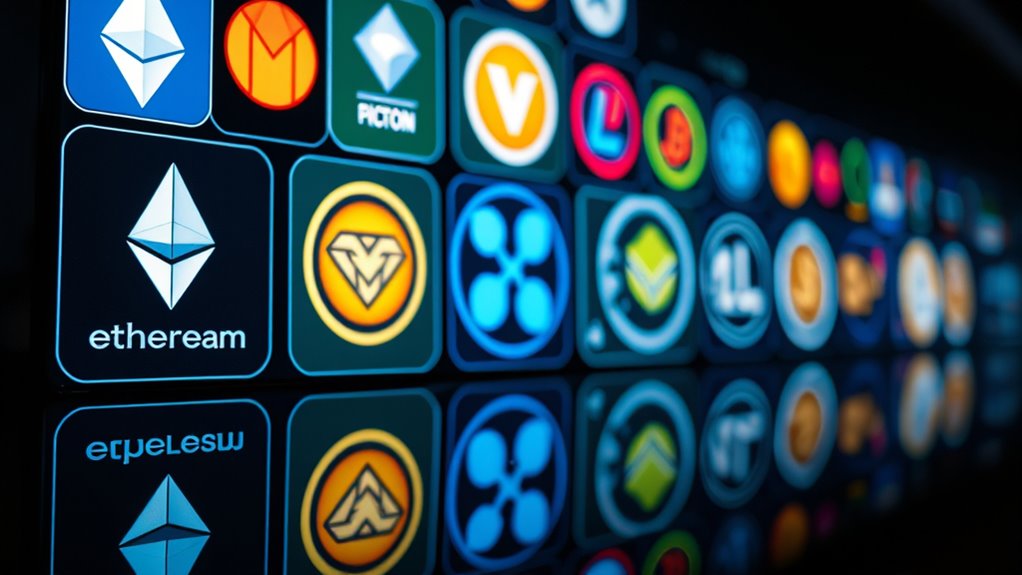
Many altcoins have gained popularity by offering specific features or addressing particular needs that Bitcoin doesn’t fully cover. Some focus on faster transactions, enhanced privacy, or specialized functions. Here are some of the most popular altcoins and their uses:
Altcoins diversify crypto with faster, private, or specialized features beyond Bitcoin’s scope.
- Ethereum (ETH): Powers decentralized applications and smart contracts, enabling developers to create new platforms.
- Ripple (XRP): Facilitates quick, low-cost international money transfers for banks and financial institutions.
- Litecoin (LTC): Offers faster transaction confirmation times, ideal for everyday payments.
- Cardano (ADA): Focuses on secure, scalable smart contracts with a research-driven approach.
Additionally, some altcoins emphasize energy-efficient options, aligning with growing environmental concerns in the crypto space.
These coins serve different niches, making the crypto landscape diverse and adaptable.
Key Features That Set Altcoins Apart

What truly sets altcoins apart from Bitcoin and each other are their unique features and functionalities. Many altcoins offer faster transaction speeds, lower fees, or improved scalability to handle more users. Some focus on enhanced privacy, making transactions more anonymous than Bitcoin’s public ledger. Others introduce smart contract capabilities, enabling decentralized applications beyond simple transfers. Certain altcoins also experiment with consensus mechanisms, like proof-of-stake or delegated proof-of-stake, to reduce energy consumption and increase efficiency. Additionally, some altcoins aim to serve specific niches, such as stablecoins that minimize volatility or tokens designed for decentralized finance (DeFi). These features allow altcoins to cater to diverse needs and innovate beyond Bitcoin’s original design, giving you a broader range of options in the crypto space.
The Technology Behind Alternative Cryptocurrencies

Understanding the technology behind altcoins helps you see how they differ from Bitcoin. You’ll explore various blockchain innovations and how they improve speed, security, or privacy. Additionally, you’ll learn about different consensus mechanisms that keep these networks running smoothly. For example, some altcoins employ proof-of-stake instead of traditional proof-of-work systems to enhance efficiency and reduce energy consumption. These technological differences can lead to faster transaction times and lower environmental impact compared to Bitcoin. Innovations like blockchain scalability solutions also contribute to more efficient and versatile altcoin networks, addressing network congestion and enabling broader adoption.
Blockchain Innovations and Variations
Blockchain innovations and variations form the backbone of alternative cryptocurrencies, introducing new ways to improve speed, security, and decentralization. These advancements allow altcoins to stand out and address limitations of traditional blockchains. For example:
- Layer 2 Solutions enable faster transactions by processing off-chain, reducing congestion.
- Sharding splits the blockchain into smaller parts, increasing scalability without sacrificing security.
- Cross-chain Technologies facilitate communication between different blockchains, expanding interoperability.
- Privacy Enhancements like zero-knowledge proofs strengthen transaction confidentiality and user anonymity.
These innovations drive the evolution of altcoins, making them more efficient and adaptable to diverse use cases. By leveraging such variations, developers continually push the boundaries of what blockchain technology can achieve.
Consensus Mechanisms Explored
Consensus mechanisms are the core processes that validate transactions and secure the network in alternative cryptocurrencies. They determine how participants agree on the blockchain’s state, ensuring trust without central authority. Proof of Work (PoW) is common, requiring miners to solve complex puzzles, which secures the network but consumes lots of energy. Proof of Stake (PoS), on the other hand, selects validators based on the amount of coins they hold and stake, making it more energy-efficient. Other mechanisms include Delegated Proof of Stake (DPoS), where stakeholders vote for delegates to validate transactions, and Byzantine Fault Tolerance (BFT), designed to reach consensus even if some nodes act maliciously. Understanding these mechanisms helps you grasp how different altcoins maintain security and decentralization. Additionally, the development of AI security measures is crucial as blockchain and AI technologies increasingly intersect to protect network integrity. Emerging innovations in consensus protocol scalability aim to improve transaction speeds and network efficiency, addressing current limitations.
Risks and Rewards of Investing in Altcoins
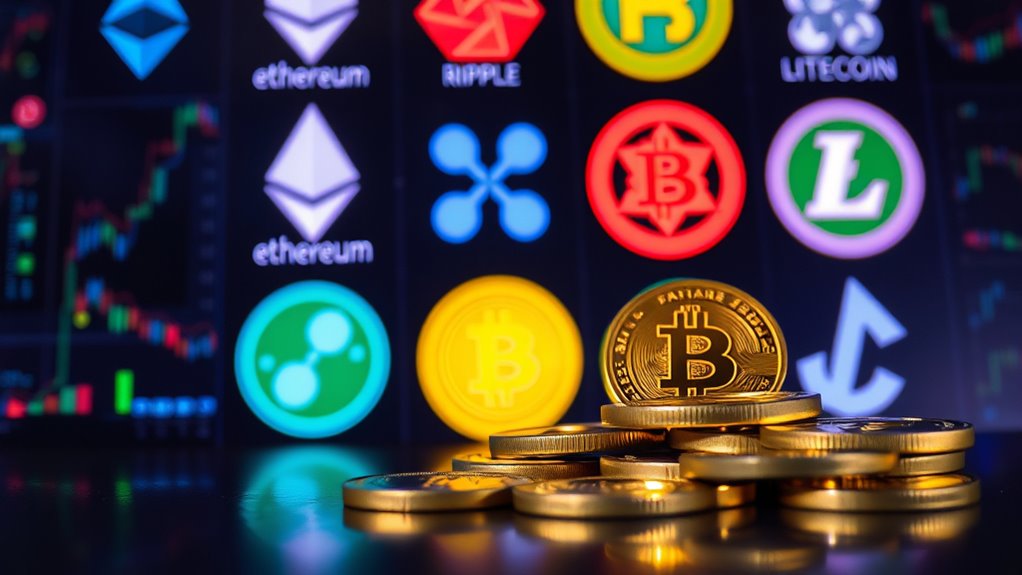
Investing in altcoins can offer significant rewards, but it also comes with substantial risks. You might see high returns if an altcoin gains popularity or innovative features, but beware of volatility and market manipulation. Consider these risks and rewards:
Investing in altcoins offers high rewards but carries risks like volatility and scams.
- Potential for High Gains: Some altcoins can multiply your investment quickly during bullish trends.
- Market Volatility: Prices can swing wildly, making timing your entry and exit essential. Understanding financial metrics can help you better assess when to buy or sell. Recognizing market cycles can also improve your strategic decisions.
- Lack of Regulation: Less oversight means higher chances of scams or fraudulent projects. The absence of regulatory protections can leave investors vulnerable to losses.
- Technological Risks: Altcoins can face security flaws or obsolescence, risking your assets. The rapidly evolving landscape of dog names can influence the perception and popularity of specific altcoins. Staying informed about security protocols is crucial to safeguard your investments.
- Market Dynamics: The influence of market manipulation and hype can distort true value and lead to sudden declines.
Balancing these factors helps you make smarter investment choices, understanding both the potential upside and the hazards involved.
How to Buy and Store Altcoins Safely
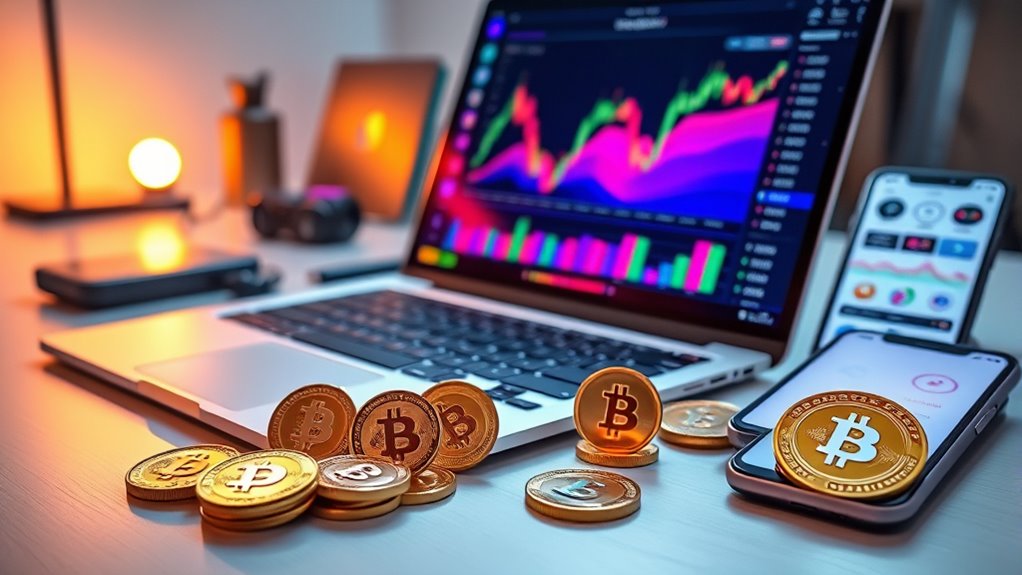
To buy and store altcoins safely, you need to choose secure exchanges and trustworthy wallets. Always verify the security measures of the platforms you use and pick wallets that safeguard your private keys. Practice safe transaction habits to prevent theft and ensure your investments stay secure. Additionally, staying informed about the best options for animated movies can help you understand the importance of trust and security in digital investments.
Choosing Secure Exchanges
Choosing a secure exchange is essential when buying and storing altcoins, as it helps safeguard your investment from theft and fraud. To guarantee safety, consider these key factors:
- Verify the exchange’s reputation and user reviews.
- Check for robust security features like two-factor authentication.
- Confirm the platform’s licensing and regulatory compliance.
- Ensure they have transparent fee structures and reliable customer support.
- Be aware of affiliate disclosures, as some platforms may promote certain services or products that could influence your choices.
- Additionally, assess the platform’s adherence to budgeting tips to ensure it maintains a secure and trustworthy environment for users.
- It’s also beneficial to review their security protocols, including encryption and cold storage options, to further protect your digital assets. Understanding the importance of security measures can help you make more informed decisions when choosing an exchange. Maintaining awareness of cybersecurity vulnerabilities, such as cyberattack risks, is crucial in safeguarding your investments.
Using Reliable Wallets
Using reliable wallets is essential for safely buying and storing altcoins, as they serve as the digital containers that protect your assets from theft and loss. Choosing the right wallet assures your funds stay secure and accessible. Hardware wallets offer offline security, making them ideal for long-term storage. Software wallets are convenient for quick transactions but should be used with caution. Consider factors like ease of use, security features, and compatibility with your chosen altcoins. Here’s a quick comparison:
| Wallet Type | Pros |
|---|---|
| Hardware Wallet | High security, offline storage |
| Software Wallet | Easy access, quick transactions |
| Mobile Wallet | Portable, user-friendly |
| Web Wallet | Convenient, accessible online |
| Paper Wallet | Cold storage, low tech risk |
Choose wisely to protect your investments effectively. Additionally, understanding the different types of wallets, such as hardware wallets, can significantly enhance your security strategy.
Practicing Safe Transactions
Practicing safe transactions is essential to protect your altcoin investments from theft and fraud. To stay secure, follow these key steps:
- Use reputable exchanges with strong security measures.
- Enable two-factor authentication on your accounts.
- Transfer your coins to a secure, offline wallet after purchase.
- Never share your private keys or seed phrases with anyone.
- Be aware of different dog breeds that can influence the types of wallets or accessories you might consider for your pet.
The Role of Altcoins in the Cryptocurrency Ecosystem

Altcoins play a essential role in diversifying the cryptocurrency ecosystem by offering alternatives to Bitcoin, each with unique features and use cases. They expand the options available, catering to different needs like faster transactions, enhanced privacy, or specialized functionalities. For instance, some altcoins focus on enabling smart contracts, while others aim to improve scalability or reduce transaction costs. By providing these varied options, altcoins promote innovation and competition within the space, encouraging developers to create new solutions. They also attract a broader audience, including niche markets and specific industries, broadening the overall adoption of cryptocurrencies. Altcoins, thus, serve as indispensable tools for experimentation and growth, helping the ecosystem evolve beyond Bitcoin’s foundational role.
Trends and Future of Altcoins
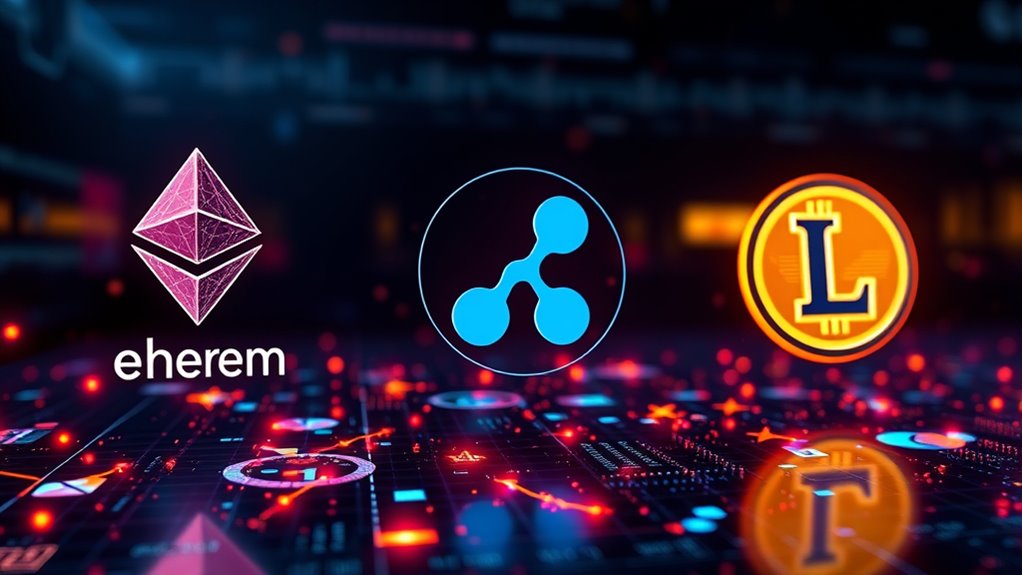
As you explore the future of altcoins, you’ll notice emerging market opportunities that could reshape investment strategies. Technological advancements are accelerating development and adoption, making some coins more innovative than ever. For example, innovations like on-device AI capabilities are influencing how new cryptocurrencies are designed to enhance user experience. However, evolving regulations may influence how these trends unfold, so staying informed is essential. Additionally, understanding GMC tuning techniques and their impact can provide insights into optimizing assets and performance, paralleling the importance of staying updated with cryptocurrency innovations. Keeping abreast of market volatility and how it affects various altcoins can also help investors make more informed decisions.
Emerging Market Opportunities
Emerging market opportunities in the altcoin landscape are rapidly evolving, driven by technological innovation and increasing adoption across diverse regions. As new coins gain traction, you can explore several key trends shaping the future:
- Regional Expansion: Altcoins are entering markets with limited access to traditional banking, offering financial inclusion.
- Decentralized Finance (DeFi): Altcoins powering DeFi platforms are creating alternatives to banks, transforming lending and saving.
- Niche Focus: Specialized coins target specific industries like gaming, supply chain, or healthcare, opening new investment avenues.
- Cross-Border Payments: Altcoins are streamlining international transactions, reducing costs and increasing speed.
Staying aware of these trends allows you to capitalize on emerging opportunities in the altcoin space.
Technological Advancements Drive
Technological advancements are propelling the evolution of altcoins, shaping their current trends and future potential. Innovations like blockchain scalability solutions, such as Layer 2 protocols, improve transaction speeds and reduce costs, making altcoins more practical for everyday use. Decentralized finance (DeFi) platforms built on altcoins expand financial access, offering new opportunities for investment and borrowing. Enhanced security features, like advanced cryptography, protect user assets and foster trust. Additionally, interoperability technologies enable different blockchain networks to communicate seamlessly, increasing versatility. As these innovations continue to develop, altcoins will become more efficient, secure, and user-friendly, paving the way for broader adoption. Your understanding of these technological trends helps you grasp how altcoins are evolving beyond mere alternatives to Bitcoin, shaping the future of digital currency.
Regulatory Impact Unfolds
Regulatory developments are substantially shaping the future landscape of altcoins. As laws evolve, you’ll notice key changes affecting their legitimacy and adoption. Here’s what to watch for:
- Governments imposing clearer rules, increasing transparency and investor protection.
- Some countries banning or restricting certain altcoins, impacting market access.
- Regulatory clarity encouraging institutional investments, boosting confidence.
- Ongoing discussions on how to classify altcoins—securities or commodities—affecting legal compliance.
These shifts can either propel altcoins forward or introduce new hurdles. Staying informed means you can adapt your strategies and avoid potential pitfalls. The future of altcoins hinges on how swiftly and effectively regulators strike a balance between innovation and risk management. Your awareness of these trends will help navigate the evolving landscape confidently.
Tips for Beginners Entering the Altcoin Market
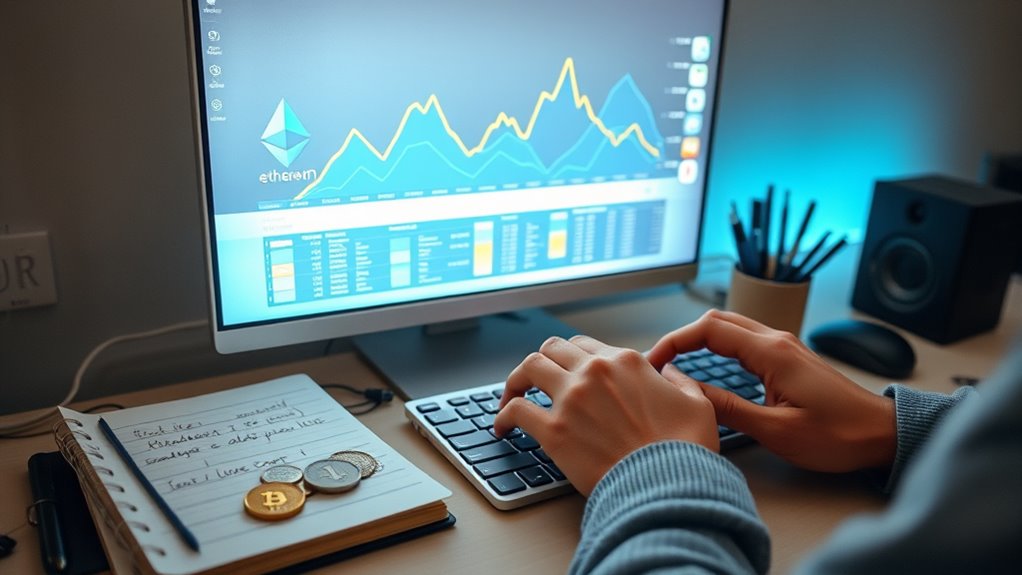
Are you new to the altcoin market? Start by doing thorough research on each coin before investing. Understand the project’s goals, team, and technology. Stick to reputable exchanges with strong security measures to protect your funds. Diversify your investments instead of putting everything into one altcoin, reducing your risk. Set clear goals and establish a budget you’re willing to lose, as altcoins can be highly volatile. Keep up with market news and trends to make informed decisions. Avoid impulsive trades based on hype or short-term price swings. Use secure wallets to store your holdings and enable two-factor authentication wherever possible. Remember, patience and continuous learning are key to steering through the altcoin landscape successfully.
Frequently Asked Questions
Can Altcoins Be Considered a Safe Investment?
You might wonder if altcoins are a safe investment. While they can offer high potential returns, they also carry significant risks due to market volatility and lack of regulation. You should research each altcoin thoroughly, diversify your investments, and only invest what you’re willing to lose. Remember, no investment is entirely safe, and understanding the risks involved helps you make smarter decisions in the crypto space.
Are All Altcoins Suitable for Beginners?
Think of exploring altcoins like sailing through a vast, unpredictable ocean. Not all altcoins are suitable for beginners; some are like stormy waters, risky and volatile, while others are calmer, more stable options. If you’re just starting out, steer clear of the turbulent seas and stick to well-established coins. Do your research, understand the risks, and gradually build your confidence before venturing into the deeper, more unpredictable parts of the crypto world.
How Do Altcoin Prices Fluctuate so Rapidly?
You might wonder why altcoin prices change so quickly. They fluctuate because of factors like market demand, investor sentiment, and news events. If more people buy, prices go up; if they sell or panic, prices drop. Additionally, altcoins often have lower liquidity than Bitcoin, making their prices more sensitive to large trades. This volatility can be exciting but also risky, so stay informed and cautious when trading.
What Factors Influence Altcoin Market Capitalization?
You can influence altcoin market capitalization through several factors. When you buy or sell large amounts, it impacts the total value. Positive news or technological upgrades attract buyers, boosting cap, while bad press or security issues cause declines. Market sentiment, trading volume, and overall crypto trends also play roles. If you stay informed and act wisely, you can better understand how these elements shape an altcoin’s market size.
Are There Regulations Specific to Altcoin Trading?
You might wonder if there are regulations specific to altcoin trading. While most regulations apply broadly to cryptocurrencies, some countries have introduced rules targeting altcoins to protect investors and prevent fraud. These regulations can vary widely, with certain jurisdictions imposing licensing requirements, anti-money laundering measures, or trading restrictions. It is crucial to stay informed about local laws, as they directly impact how you buy, sell, or hold altcoins legally and safely.
Conclusion
Just like the explorers charting new territories, diving into altcoins opens a world of opportunity and innovation. With knowledge and caution, you can navigate these digital landscapes confidently. Remember, every successful journey begins with understanding the terrain—so keep learning, stay curious, and embrace the ever-evolving world of cryptocurrencies. Your adventure in altcoins awaits, and who knows? You might just find your own treasure in this digital frontier.










